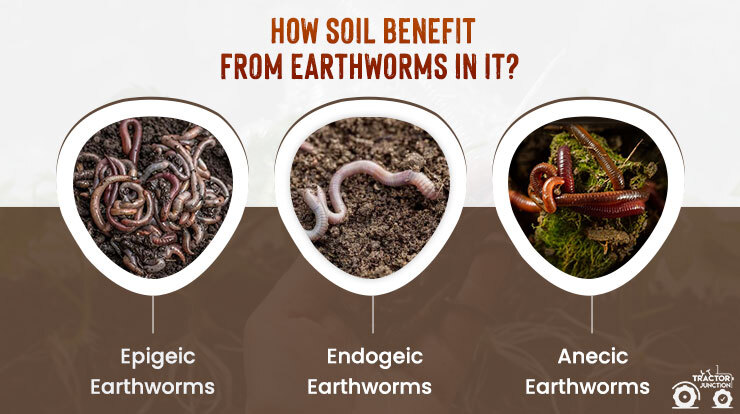
Earthworms and soil have a never-ending reciprocating relationship that benefits both the contributors. What’s more, the earthworm’s scientific name is Lumbricina. Moreover, these are known as a farmer’s friend as earthworms in soil increase soil fertility. Henceforth, boosting nutrients in the soil leads to enhancement in the health of plants dependent on the chunk of soil. It is safe to hold that these earthworms thrive in every kind of soil.
Further, their cylindrical body is tube-shaped. The length of the digestive system in the body decides the body’s length of fertility, increasing Lumbricina. These worms breathe through their skin. In regard to what they eat, earthworms depend on living bacteria, fungi, protozoa, plant remains, and other microbes. Henceforth, in this blog, we will study the contributions of earthworms in soil and their various other aspects in agriculture. Let’s dive in.
Read – Complete Review of Mahindra JIVO 245 DI
Earthworms in Soil: Why They are Important?
Earthworms are also known as boon worms when taking soil fertility into concern. Furthermore, their ability to degenerate almost every organic matter into fertile humus is incredible. Moreover, the degenerated organic matter (aka humus) are the pre-soil structures that form the top layer of soil. The porous humus is known to increase soil fertility. Furthermore, earthworms in the soil make it arable and breathe air in and out of the soil.
In this regard, these worms are responsible for breathing soil as these open water and air pipelines. In addition to the above facts, these alter the important organic soil components, which increase the microchemical bonds in the soil. Henceforth increasing the overall soil strength. Earthworms are cylindrical silky tubes with an ultra-smooth body structure. Earthworms in soil are important as these have the potential to pertain to soil fertility. Henceforth, as crucial as the term sustainability in agriculture, earthworms act as intestines for soil.
Read – What is Soil Erosion? Best Ways to Reduce its Impact
How does Soil Benefit from Earthworms in it?

Earthworms are among the few creatures on the planet that are dependent on soil’s pH, temperature, salts, aeration, texture, and availability of decomposing organic matter and/or living microbes. The health benefits for the soil of keeping earthworms reside in their type of existence. Earthworms in soil benefit the health of the soil as per the below given three types.
There are three types of earthworms:
1. How do Epigeic Earthworms help soil?
The term ‘Epigeic’ represents the Greek word meaning ‘on the earth’. These types of earthworms do not build burrows (what’s called their self-made home). Speaking in regard, these instead live with their decomposing food on the surface of the soil. Also known by the name compost earthworms, these earthworms feed on decaying organic matter present on the topsoil.
This type of earthworm is known to break down and consume decomposing organic matter more quickly than the two. Furthermore, these reproduce a bit quicker than the other two types. Hence, these earthworms help in adding fertility to the top layer of soil. Furthermore, acting as organic vermicomposts (i.e. fertiliser producers), these help in reproducing the lost fertile topsoil.
2. How do Endogeic Earthworms help soil?
Endogeic is a Greek word that means ‘within the earth’. These earthworms literally and preferably live within the soil surface. Furthermore, this type of earthworm in the soil is found in the uppermost layers. Additionally, these appear on the top surface of the soil in rainy seasons only as there is extra moisture in the atmosphere. Henceforth, this extra moisture in the soil prevents them from drying out. When the soil health benefits are considered, these worms are responsible for the aeration of the soil and the mixing of minerals.
3. How do Anecic Earthworms help soil?
The Greek word ‘Anecic’ means ‘out of the earth’. Ironically, these types of earthworms in soil live inside the soil. But, these occasionally appear on the ground to grab food. These live as low as six feet below the soil surface. Henceforth creating permanent burrows in the soil. Furthermore, the type of earthworms is mostly dependent upon fresh organic matter and litter. Furthermore, these are also known to eat soil. Henceforth, the litter they produce after eating soil is known to be very fertile and hence acts as fertiliser for the top layer of soil.
Henceforth, all three types of earthworms are known to benefit the health of the soil in the above ways.
The Reciprocating Relationship Between Earthworms, Soil and Farmers
Earthworms and soil have a never-ending reciprocating relationship that is majorly responsible for soil fertility and sustainability. Further, earthworms in the soil make it porous and increase tilth, aeration, and drainage capacity. Furthermore, these are known to degrade organic matter into important nutrients that increase the fertility of the soil. Henceforth, acting as friends for farmers. Let us take a look at all the ways these can help a piece of farmer’s land.
1. Increasing nutrients and their recycling in the soil

Earthworms are known to increase nutrients multifold. A study says the top layer of soil produced by them can have five times the nitrogen content, seven times the phosphate content, and thousand times the number of beneficial bacteria as compared to a normal soil sample today.
2. An important part of the ecological food web

These are known to be used as food for various predators such as birds, fishes, endangered snails etc.
3. Help to increase crop productivity

The pastoral crop productivity of the soil is observed to have risen by 25-30% in a case study. Earthworms in the soil can prevent the surface hindrance called thatch, which prevents the water from penetrating the soil. This, in fact, facilitates the nutrients from flowing off.
4. Regulating and controlling pests in the soil

As per studies conducted by various governmental agricultural institutions in India, it found that earthworms in soil help in restoring and multiplication of important soil-enriching microbes. Furthermore, these known to release and litter microbes such as insect-eating bacteria that help in controlling insects and pests in the soil.
Earthworms in Soil: The key to Sustainable Agriculture
Earthworms known to increase soil fertility and act as chief vermicomposts in making organic fertilisers. Further speaking, organic farming and other sustainable crop production methods are very much dependent on these earthworms for maintaining and increasing soil fertility. Factually Factually put, without earthworms, sustainable methods of crop production, such as organic farming, primitive subsistence farming, plantation farming, etc., are not possible.
Furthermore, sustainable agriculture is a lot dependent on occasionally bringing back the organic or primitive methods of agriculture for increased crop production. Henceforth, earthworms have larger-than-expected roles to play in the future when it comes to sustainable agriculture.
The Unwrapped Truth
This blog has discussed the various contributions of earthworms to the soil. Earthworms known as boon worms when taking soil fertility into concern. Henceforth, boosting nutrients in the soil leads to enhancement in the health of plants. Henceforth, the earthworms are of utmost importance when the longevity and sustainability of the earth’s arable land taken into concern. What are your thoughts on the topic?
Update your farming toolkit with the best farming tractors from powerful brands with us. And add suitable farming implement to speed up your crop production.
Related Post
Geranium Plant Farming in India
Role of Direct Benefit Transfer in Indian agriculture
